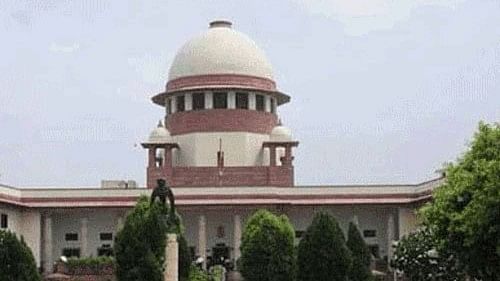
The apex court, in its judgement delivered on September 26 last year on a plea by the veteran, had directed the IAF to pay around Rs 1.5 crore as compensation to him.
Credit: PTI File Photo
New Delhi: The Supreme Court on Tuesday directed that Rs 18 lakh be immediately paid as compensation to an Indian Air Force (IAF) veteran who contracted HIV due to transfusion of infected blood at a military hospital in Jammu and Kashmir's Samba in 2002.
The apex court, in its judgement delivered on September 26 last year on a plea by the veteran, had directed the IAF to pay around Rs 1.5 crore as compensation to him.
The former soldier, who held a combatant rank, had taken ill during "Operation Parakram", launched in the aftermath of the terrorist attack on Indian Parliament on December 13, 2001, and was admitted to the hospital where he had to be administered one unit of blood.
His petition alleging contempt of the directions issued by the top court in its 2023 verdict came up for hearing before a bench of Justices B R Gavai and Sandeep Mehta on Tuesday.
Besides ordering that Rs 18 lakh be immediately paid to him, the top court directed that he shall be provided medical treatment at the Base hospital here and paid an amount of Rs 25,000 for each visit for travel and lodging expenses.
The bench also directed that his disability be considered as 100 per cent for paying him the disability pension.
It noted the submissions of an advocate, who is assisting the top court in the matter as an amicus curiae, that there were certain issues which were required to be addressed.
The amicus referred to one of the paragraphs of the 2023 verdict which noted, "As time progresses, he would need the assistance of a helper. Even conservatively calculated, such a helper would have to be paid about Rs 10,000 to Rs 15,000 per month. If a calculation of average of Rs 10,000 to Rs 15,000 (i.e. Rs 12,500) for twelve years is taken into account, the total sum would be Rs 18,00,000".
The amicus also raised issues including those of disability pension, his treatment, and travel and lodging expenses.
"In the meantime, we direct the respondents to immediately pay to the petitioner an amount of Rs 18 lakh,” the bench said, adding that this amount be deposited in his account.
It said the remainder of the amount, which the respondents were required to pay to the man, be deposited in the registry of the apex court within two weeks.
The bench noted the submissions of Additional Solicitor General (ASG) Vikramjit Banerjee that a petition seeking review of the 2023 verdict has been filed and the contempt petition be kept pending till its outcome.
On the issue of disability pension, it noted that as per the ASG's submission, a medical board will assess his disability.
"In so far as the disability pension is concerned, we find that in the peculiar facts and circumstances of the case, if we permit the procedure of going through the medical board, it will lead to another round of litigation," the bench said.
"In that view of the matter, we direct the respondent to consider the petitioner's disability as 100 per cent and pay the disability pension," it said, adding the pension be deposited in his account prior to the 10th day of every month.
The bench, which said this deposit shall commence from the month of March 2024, posted the matter for further hearing on July 16.
In its 2023 verdict, the apex court had said, "It is held that the appellant is entitled to compensation, calculated at Rs 1,54,73,000 towards compensation on account of medical negligence of the respondents, who are held liable for the injury suffered by the appellant."
It had said since individual liability cannot be assigned, the respondent organisations (IAF and Indian Army) are held vicariously liable, jointly and severally.
"The amount shall be paid to the appellant within six weeks by the IAF, his employer; it is open to the IAF to seek reimbursement, to the extent of half the sum, from the Indian Army. All arrears related to disability pension too shall be disbursed to the appellant within the said six weeks period," the apex court had said.
The top court had passed the verdict on an appeal by the IAF veteran who challenged an order of the National Consumer Disputes Redressal Commission (NCDRC) rejecting his claim for compensation.